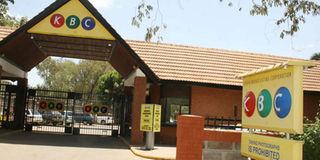Time to save ailing public broadcaster

The poor handling of KBC speaks to the lack of understanding of the important role media and communication can play in development. FILE PHOTO | NATION MEDIA GROUP
What you need to know:
- The national broadcaster is in critical condition, a very poor image of the media giant of the 1970s and 1980s.
- The report made 20 proposals for the restructuring of KBC into a national and fully funded public service media.
It has been decades since anybody offered any critical thinking on the state of the Kenya Broadcasting Corporation (KBC).
The national broadcaster is in critical condition, a very poor image of the media giant of the 1970s and 1980s.
As we mark this year’s World Press Freedom Day, it is an ideal moment to focus on the theme - “Critical minds for critical times: Media’s role in advancing peaceful, just and inclusive societies”, with KBC as the focus.
INSOLVENT
Speaking in March, the Principal Secretary in the Ministry of Information, Communication and Technology, Mr Sammy Itemere, suggested it is the end of the road for the KBC as the government is reluctant to pour more money into it.
A couple of weeks ago, Auditor General Edward Ouko pronounced KBC technically insolvent with a Sh5.3 billion loss for the financial year 2014-2015 and a cumulative debt of Sh41 billion.
It is a debt that KBC never negotiated or planned for.
Nearly 30 years ago, Kenya negotiated a loan with Japan for the installation of new medium wave equipment for radio transmission countrywide as part of efforts to modernise the state broadcaster, which was the only radio and television station at the time.
An agreement was reached at a cost of Sh2.4 billion and the project began in 1990.
ABUSE AND NEGLECT
That is the basis of the debt that continues to accrue interest.
At about the same time, the government converted KBC into a parastatal.
Its public funding was drastically reduced and it was required to generate its own revenue.
The government quietly transferred the debt to the books of KBC.
The history of KBC since independence is full of examples of this kind of abuse and neglect.
Recommendations made in June 2012 to Parliament by the Joint Committee on Energy, Communications & Information and House Broadcasting Committee on a public petition on the KBC have been ignored.
The report made 20 proposals for the restructuring of KBC into a national and fully funded public service media.
One was conversion of the crippling debt, which had reached Sh22 billion, into equity, and which would have made the station solvent.
DIGITAL BROADCASTING
None of the recommendations have been implemented. The station has endured political interference in its running for 54 years.
Staff have been intimidated, harassed, bullied, transferred and fired to force them to produce politically correct content.
In 2011, in the run-up to the switch to digital broadcasting, KBC became one of two licensed signal distributors through its subsidiary Signet, the other being a Chinese-backed company Pan-African Network Group (PANG).
In 2015, for reasons that remain unclear, KBC was ordered by the Treasury to hand over all its shares in Signet to the government and with it the Sh10 million monthly income from the 38 broadcasters it carried.
Meanwhile, a 100-acre piece of land set aside for KBC headquarters at Jamhuri, Nairobi, mysteriously became 40 acres, as 11.65 hectares was allocated to a third party before being recovered by the anti-corruption agency.
INFORMATION
The poor handling of KBC speaks to the lack of understanding of the important role media and communication can play in development and the importance of accurate information in the hands of citizens.
The BBC is recognised worldwide and yet it is the public service broadcaster of the UK.
The unfinished conversation about the fate of public service media is about more than saving KBC.
Creating strong public service media will only be possible if this begins with a solid understanding of why they are needed and that must begin with an evaluation of how KBC arrived where it is today.
Ms Lukalo heads the Media Policy Research Centre. [email protected]





